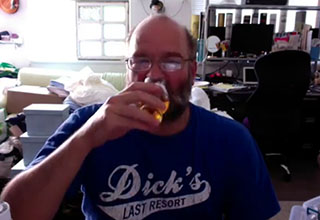Milton Friedman interview from 1991 on America’s War on Drugs
In 1991 Nobel economist Milton Friedman was interviewed by Emmy Award-winning drug reporter Randy Paige on “America’s Drug Forum,” a national public affairs talk show that appeared on public television stations. In the interview, Milton Friedman discussed in detail his views on America’s War on Drugs, legalization of drugs, the role of government in a free society, and his pessimistic view of America’s future if we continue moving in the direction of socialism. Videos of the entire 30-minute interview appears below in three parts, and here is the transcript of the interview.
Here are some of my favorite parts of the interview (emphasis added):
1. Paige: Let us deal first with the issue of legalization of drugs. How do you see America changing for the better under that system?
Friedman: I see America with half the number of prisons, half the number of prisoners, ten thousand fewer homicides a year, inner cities in which there’s a chance for these poor people to live without being afraid for their lives, citizens who might be respectable who are now addicts not being subject to becoming criminals in order to get their drug, being able to get drugs for which they’re sure of the quality. You know, the same thing happened under prohibition of alcohol as is happening now.
Under prohibition of alcohol, deaths from alcohol poisoning, from poisoning by things that were mixed in with the bootleg alcohol, went up sharply. Similarly, under drug prohibition, deaths from overdose, from adulterations, from adulterated substances have gone up.
2. Paige: For us to understand the real root of those beliefs, how about if we just talk a minute about free market economic perspective, and how you see the proper role of government in its dealings with the individual.
Friedman: The proper role of government is exactly what John Stuart Mill Said in the middle of the 19th century in “On Liberty.” The proper role of government is to prevent other people from harming an individual. Government, he said, never has any right to interfere with an individual for that individual’s own good.
The case for prohibiting drugs is exactly as strong and as weak as the case for prohibiting people from overeating. We all know that overeating causes more deaths than drugs do. If it’s in principle OK for the government to say you must not consume drugs because they’ll do you harm, why isn’t it all right to say you must not eat too much because you’ll do harm? Why isn’t it all right to say you must not try to go in for skydiving because you’re likely to die? Why isn’t it all right to say, “Oh, skiing, that’s no good, that’s a very dangerous sport, you’ll hurt yourself”? Where do you draw the line?
3. Paige: Is it not true that the entire discussion here, the entire drug problem is an economic problem to…
Friedman: No, it’s not an economic problem at all, it’s a moral problem.
Paige: In what way?
Friedman: I’m an economist, but the economics problem is strictly tertiary. It’s a moral problem. It’s a problem of the harm which the government is doing.
I have estimated statistically that the prohibition of drugs produces, on the average, ten thousand homicides a year. It’s a moral problem that the government is going around killing ten thousand people. It’s a moral problem that the government is making into criminals people, who may be doing something you and I don’t approve of, but who are doing something that hurts nobody else. Most of the arrests for drugs are for possession by casual users.
Now here’s somebody who wants to smoke a marijuana cigarette. If he’s caught, he goes to jail. Now is that moral? Is that proper? I think it’s absolutely disgraceful that our government, supposed to be our government, should be in the position of converting people who are not harming others into criminals, of destroying their lives, putting them in jail. That’s the issue to me. The economic issue comes in only for explaining why it has those effects. But the economic reasons are not the reasons.
Of course, we’re wasting money on it. Ten, twenty, thirty billion dollars a year, but that’s trivial. We’re wasting that much money in many other ways, such as buying crops that ought never to be produced.
4. Paige: There are many who would look at the economics–how the economics of the drug business is affecting America’s major inner cities, for example.
Friedman: Of course it is, and it is because it’s prohibited. See, if you look at the drug war from a purely economic point of view, the role of the government is to protect the drug cartel. That’s literally true.
Paige: Is it doing a good job of it?
Friedman: Excellent. What do I mean by that? In an ordinary free market–let’s take potatoes, beef, anything you want–there are thousands of importers and exporters. Anybody can go into the business. But it’s very hard for a small person to go into the drug importing business because our interdiction efforts essentially make it enormously costly. So, the only people who can survive in that business are these large Medellin cartel kind of people who have enough money so they can have fleets of airplanes, so they can have sophisticated methods, and so on.
In addition to which, by keeping goods out and by arresting, let’s say, local marijuana growers, the government keeps the price of these products high. What more could a monopolist want? He’s got a government who makes it very hard for all his competitors and who keeps the price of his products high. It’s absolutely heaven.
Legalization is a way to stop–in our forum as citizens– a government from using our power to engage in the immoral behavior of killing people, taking lives away from people in the U.S., in Colombia and elsewhere, which we have no business doing.
5. Paige: So, you see the role of government right now as being just as deadly as if Uncle Sam were to take a gun to somebody’s head.
Friedman: That’s what he’s doing, of course. Right now Uncle Sam is not only taking a gun to somebody’s head, he’s taking his property without due process of law. The drug enforcers are expropriating property, in many cases of innocent people on whom they don’t have a real warrant. That’s a terrible way to run what’s supposed to be a free country.
6. Paige: What scares you the most about the notion of drugs being legal?
Friedman: Nothing scares me about the notion of drugs being legal.
Paige: Nothing.
Friedman: What scares me is the notion of continuing on the path we’re on now, which will destroy our free society, making it an uncivilized place. There’s only one way you can really enforce the drug laws currently. The only way to do that is to adopt the policies of Saudi Arabia, Singapore, which some other countries adopt, in which a drug addict is subject to capital punishment or, at the very least, having his hand chopped off. If we were willing to have penalties like that–but would that be a society you’d want to live in?
7. Paige: Last question. You have grandchildren.
Friedman: Absolutely. I have a two-year-old granddaughter named Becca.
Paige: When you look at Becca, what do you see for her and for her future?
Friedman: That depends entirely upon what you and your fellow citizens do to our country. If you and your fellow citizens continue on moving more and more in the direction of socialism, not only inspired through your drug prohibition, but through your socialization of schools, the socialization of medicine, the regulation of industry, I see for my granddaughter the equivalent of Soviet communism three years ago.






2 Comments